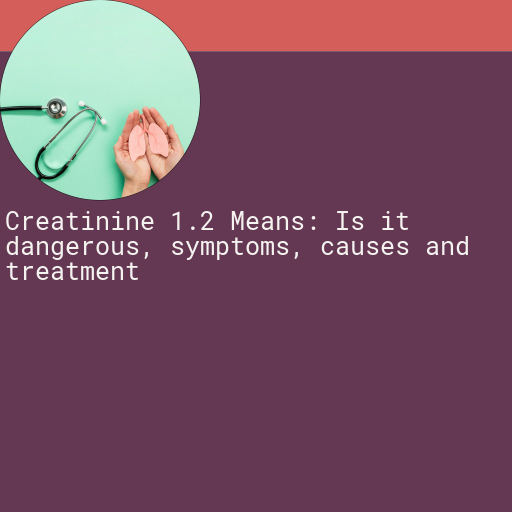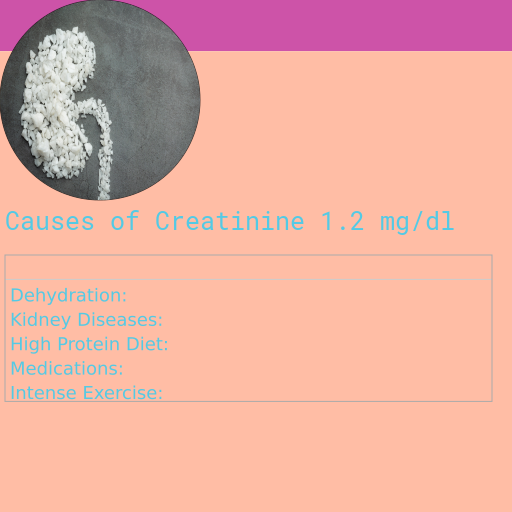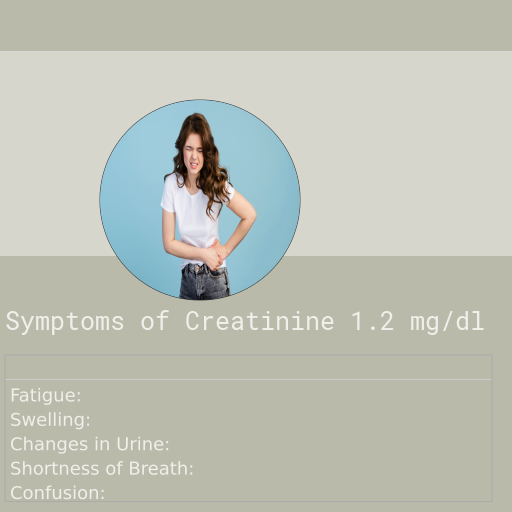Creatinine 1.2 : Is it Dangerous, Causes, Symptoms and More
Understanding the significance of creatinine levels in your body is crucial for maintaining optimal health. Elevated creatinine can be a red flag, indicating potential issues with your kidneys' functionality. In this blog, we'll delve into what a creatinine level of 1.2 means, explore the various causes and symptoms associated with abnormal creatinine levels, and discuss potential treatment options. Whether you're looking to understand the implications of your latest blood test or seeking ways to keep your kidneys healthy, this comprehensive guide has got you covered.

What is Creatinine
Creatinine is a byproduct of protein breakdown, specifically from muscle metabolism, and it is considered a waste product with no use in the body. The kidneys are responsible for filtering creatinine out of the bloodstream and excreting it through urine. When kidney function is compromised, creatinine levels can accumulate, which may be an indicator of potential kidney issues. Understanding the role of creatinine and how it should be managed in the body is crucial for maintaining overall health.
- Muscle Metabolism: The primary source of creatinine is muscle metabolism. When muscle tissue breaks down, it releases creatinine into the bloodstream.
- Dietary Intake: Consuming foods high in creatine, such as red meat and fish, can increase the levels of creatinine in the body.
- Supplements: Many athletes and bodybuilders take creatine supplements to enhance performance, which can also elevate creatinine levels.
- Kidney Function: The kidneys filter creatinine out of the bloodstream. Impaired kidney function can lead to higher levels of creatinine.
- Medications: Certain medications can affect creatinine levels either by impacting kidney function or muscle metabolism.
- Exercise: Intense physical activity can temporarily increase creatinine levels due to muscle breakdown.
- Dehydration: Lack of sufficient fluids can concentrate creatinine levels in the blood, making them appear higher.
Normal Range of Creatinine in Adults
In adults, the normal range of creatinine in blood typically lies between 0.6 to 1.2 milligrams per deciliter (mg/dL) for men and 0.5 to 1.1 mg/dL for women. These values can vary slightly based on factors such as age, muscle mass, and overall health. Creatinine levels are important indicators of kidney function, as the kidneys are responsible for filtering and eliminating this waste product from the body. Maintaining creatinine within this normal range is crucial for proper bodily function and overall health.
| Age Group | Normal Creatinine Range (mg/dL) |
|---|---|
| 0 to 1 year | 0.2 - 0.4 |
| 1 to 12 years | 0.3 - 0.7 |
| 13 to 18 years | 0.5 - 1.0 |
| 19 to 59 years | 0.6 - 1.3 |
| 60 years and above | 0.6 - 1.2 |
Causes of Creatinine 1.2
Elevated creatinine levels can be a cause for concern as they often indicate that the kidneys are not functioning properly. Various factors can contribute to an increase in creatinine levels, including dehydration, high-protein diets, and certain medications. More serious causes can include chronic kidney disease, glomerulonephritis (inflammation of the kidney's filtering units), and acute kidney injury. Understanding the underlying causes is crucial for appropriate treatment and management of elevated creatinine levels.
- Dehydration: Lack of sufficient water intake can cause elevated creatinine levels.
- Kidney Diseases: Conditions such as chronic kidney disease or acute kidney injury often lead to increased creatinine.
- High Protein Diet: Consuming large amounts of protein can temporarily raise creatinine levels.
- Medications: Certain drugs, including NSAIDs and some antibiotics, can affect creatinine levels.
- Intense Exercise: Strenuous physical activity can lead to elevated creatinine due to muscle breakdown.
- Diabetes: Poorly managed diabetes can damage kidneys, resulting in higher creatinine levels.
- Hypertension: High blood pressure can harm kidney function, causing elevated creatinine.
- Urinary Tract Obstructions: Conditions like kidney stones can block urinary flow and elevate creatinine.

Symptoms of Creatinine 1.2
When creatinine levels rise, it can be an indication of underlying health issues, often related to kidney function. Elevated creatinine may not always present noticeable symptoms, but when it does, individuals might experience signs such as fatigue, swelling in the extremities, changes in urine output, and shortness of breath. Recognizing these symptoms early can be crucial in diagnosing and managing potential kidney problems effectively.
- Fatigue: Elevated creatinine levels can lead to feelings of tiredness and lack of energy.
- Swelling: Noticeable swelling, particularly in the face, hands, and feet, can be a symptom.
- Changes in Urine: A significant change in urine color, frequency, or volume may indicate elevated creatinine.
- Shortness of Breath: Difficulty breathing can occur when the kidneys are not filtering properly.
- Confusion: Elevated creatinine can affect mental clarity and concentration.
- Nausea: Feeling nauseous or experiencing vomiting is a common symptom.
- Chest Pain: Pain or tightness in the chest can be related to kidney issues.
- Muscle Cramps: Painful cramps and muscle spasms may occur due to electrolyte imbalances.

Dangers of Creatinine 1.2
While creatinine itself does not directly affect the body, its levels are an important indicator of overall health, particularly kidney function. Elevated creatinine levels can be a sign of kidney failure or other serious medical conditions. When kidneys are not functioning properly, they are unable to filter waste products effectively, leading to the accumulation of harmful substances like urea in the bloodstream. These waste products can cause a range of health issues, making it crucial to monitor and address elevated creatinine levels promptly.
- Kidneys: Elevated creatinine levels can indicate kidney dysfunction or chronic kidney disease, leading to impaired filtration and toxin build-up.
- Heart: High creatinine can be a sign of cardiovascular issues, like hypertension or heart disease, potentially causing heart failure.
- Liver: Liver diseases can also elevate creatinine levels, resulting in impaired liver function and further complicating health.
- Muscles: Elevated creatinine can be a marker of muscle breakdown or damage, which can occur due to conditions like rhabdomyolysis.
- Brain: High creatinine levels can lead to neurological issues such as confusion, seizures, or even coma in severe cases.
- Gastrointestinal System: Kidney dysfunction linked to high creatinine may cause nausea and vomiting, impacting overall digestive health.
- Skin: Elevated creatinine levels can result in itchy skin or pruritus, due to the build-up of waste products in the body.
- Respiratory System: Severe kidney issues causing high creatinine can lead to fluid retention in the lungs, resulting in difficulty breathing.
Home remedies for Creatinine 1.2
Disclaimer: Elevated creatinine levels are a sign of potential kidney dysfunction and should not be treated at home without professional medical advice. While some basic supportive care measures can be taken to support kidney health, such as maintaining proper hydration, following a balanced diet low in proteins, and avoiding nephrotoxic medications, it is crucial to consult a healthcare provider for a comprehensive evaluation and appropriate treatment plan. Self-treatment can lead to worsening of the condition and other serious health complications.
- Stay Hydrated: Ensuring you drink enough water can help your kidneys function properly and maintain optimal creatinine levels.
- Monitor Protein Intake: Reducing the consumption of high-protein foods, such as red meat, can lessen the burden on your kidneys.
- Limit Salt and Potassium: Consuming too much salt or potassium can strain your kidneys. Opt for a balanced diet with controlled amounts.
- Avoid Over-the-Counter Painkillers: NSAIDs and other pain medications can harm your kidneys if used excessively. Look for alternative pain relief methods.
- Exercise Regularly: Engaging in light to moderate physical activities can improve overall kidney function and help maintain healthy creatinine levels.
Treatment for Creatinine 1.2
When creatinine levels reach 1.2, medical treatment by a doctor is essential. The primary treatment goals include stabilizing kidney function, which can involve various interventions depending on the underlying cause. Doctors may need to stop harmful drugs that are exacerbating kidney issues, as well as treat infections that could be contributing to elevated creatinine levels. Comprehensive care and monitoring are crucial to prevent further kidney damage and to ensure overall health stability.
- Hydration: Increasing your water intake can help to flush out excess creatinine from your bloodstream.
- Dietary Changes: Reducing the consumption of protein-rich foods, which can produce creatinine as a byproduct, may be recommended by your doctor.
- Medications: Certain medications might be prescribed to manage underlying conditions that could be causing elevated creatinine levels.
- Regular Monitoring: Frequent check-ups and blood tests to monitor creatinine levels and kidney function are crucial.
- Lifestyle Modifications: Adopting a healthier lifestyle, including regular exercise and avoiding alcohol and tobacco, can support kidney health.
GFR with Creatinine of 1.2
The Glomerular Filtration Rate, or GFR, is a critical measure of kidney health that assesses how well your kidneys are filtering blood. Unlike the absolute value of creatinine, which can be influenced by factors like age, sex, muscle mass, and diet, GFR provides a more comprehensive overview of kidney function. It takes into account these variables, offering a more accurate picture of your kidneys' efficiency. By understanding your GFR, you can gain better insights into your kidney health, making it a more relevant and actionable metric compared to merely looking at creatinine levels alone.
| Grade | GFR (mL/min) | Meaning |
|---|---|---|
| G1 | ≥ 90 | Normal or high |
| G2 | 60-89 | Mildly decreased |
| G3a | 45-59 | Mildly to moderately decreased |
| G3b | 30-44 | Moderately to severely decreased |
| G4 | 15-29 | Severely decreased |
| G5 | < 15 | Kidney failure |
What is my GFR for a creatinine of 1.2
| Age | Gender | GFR |
|---|---|---|
| 18 | male | 78.86 ml/m2 |
| 45 | male | 65.47 ml/m2 |
| 60 | male | 61.76 ml/m2 |
| 80 | male | 58.26 ml/m2 |
| 18 | female | 58.51 ml/m2 |
| 45 | female | 48.58 ml/m2 |
| 60 | female | 45.82 ml/m2 |
| 80 | female | 43.23 ml/m2 |
Table of danger posed by Creatinine 1.2 in male across different ages
| Age Group | Is Creatinne of 1.2 dangerous? |
|---|---|
| 25yrs - 70 yrs | above normal, not dangerous |
| 70yrs - 95 yrs | significantly high, but not dangerous, needs attention |
Table of danger posed by Creatinine 1.2 in female across different ages
| Age Group | Is Creatinne of 1.2 dangerous? |
|---|---|
| 25yrs - 66 yrs | significantly high, but not dangerous, needs attention |
| 66yrs - 95 yrs | bad, and could be dangerous, Consult a doctor |

Which other tests should be done for a creatinine value of 1.2?
While a creatinine level of 1.2 might prompt concerns, it is also essential to consider other diagnostic tests to get a comprehensive understanding of kidney health. Tests like electrolytes can reveal imbalances that might affect various bodily functions, while a renal profile provides detailed insights into the overall functioning of the kidneys. Additionally, measuring blood gas levels can help determine how well the lungs and kidneys are managing acid-base balance in the blood, offering a more rounded view of your physiological state. Together, these tests create a fuller picture, aiding in more accurate diagnosis and treatment plans.
- Electrolytes: This test measures the levels of essential minerals like sodium, potassium, and chloride in your blood. Abnormal levels can indicate issues with kidney function, hydration, and other metabolic processes.
- Renal Profile: A comprehensive assessment that includes tests for creatinine, blood urea nitrogen (BUN), and glomerular filtration rate (GFR), providing a detailed picture of kidney health and functionality.
- Blood Gas Levels: These tests measure the levels of oxygen, carbon dioxide, and the pH of your blood. They help assess lung function and the body's acid-base balance, which can be impacted by kidney issues.
- HbA1c: This test provides an average level of blood glucose over the past two to three months. It is crucial for diagnosing and managing diabetes, which can affect kidney health.
- Liver Enzymes: Tests such as ALT and AST measure the levels of enzymes released by the liver. Elevated levels can indicate liver damage or disease, which may have implications for kidney function as well.

 By: Dr.Bhargav Raut
By: Dr.Bhargav Raut